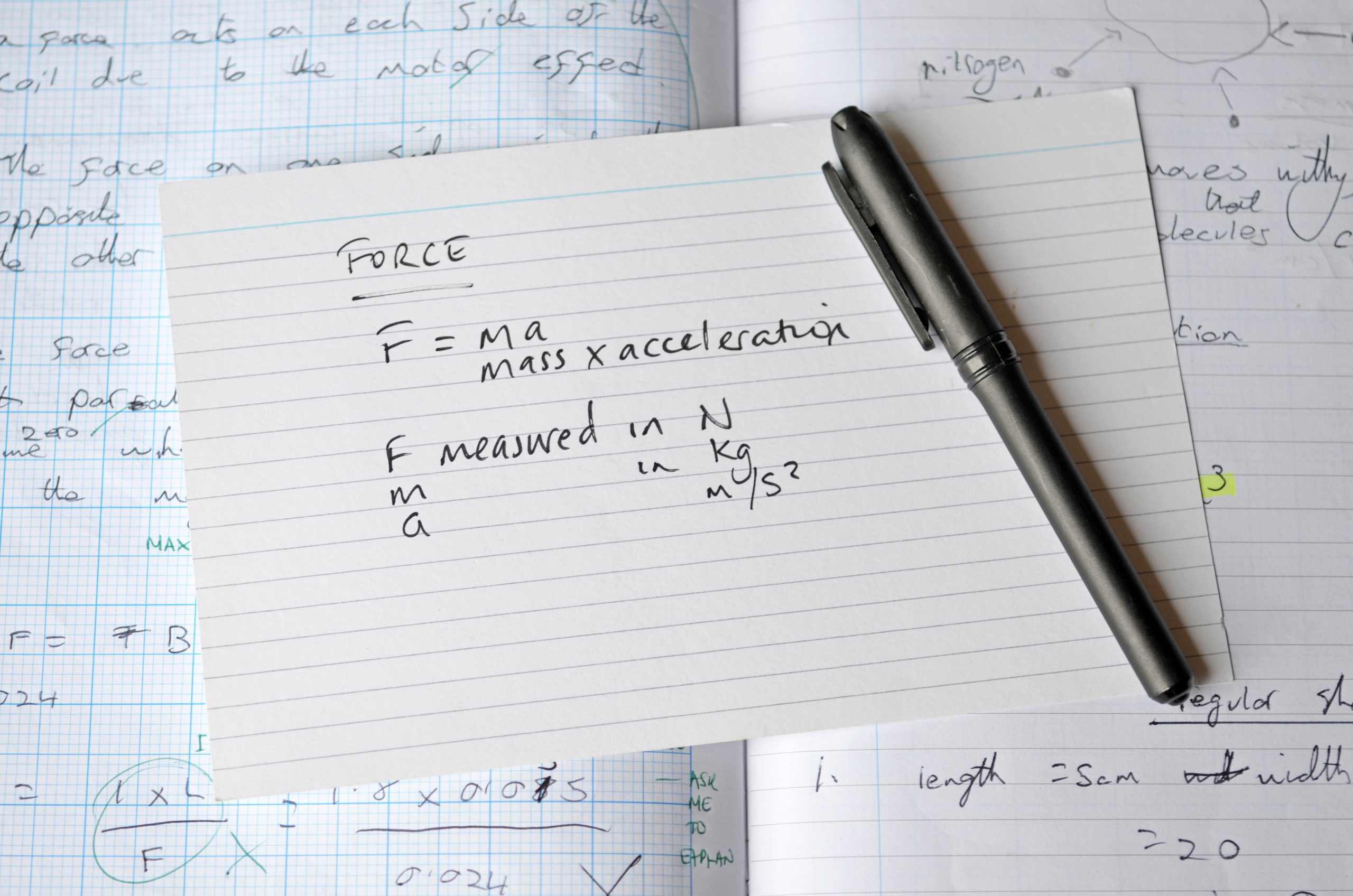This is a brief blog on how to run revision sessions for GCSE Science. Forgive me, but I’m going to start by being a bit contrary.
Retrieval vs revision
It’s best not to leave revision to one-off revision sessions. Instead, what’s preferable is to build a culture of “retrieval” with your classes. Students should actively be recalling and practising prior knowledge in an attempt to remember it for longer periods of time. And we, as teachers, should be facilitating and encouraging this.
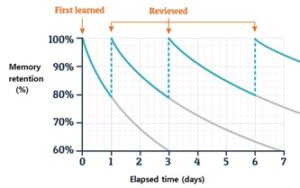
Ebbinghaus’ forgetting curve has become a familiar sight for many[1]. Ebbinghaus got some volunteers to memorise some completely made-up syllables with no links to syllables used in everyday language. Then looked at how many were remembered at different time intervals.
The executive summary of this was that the more times the syllables were recapped/retrieved the longer the time that they were memorised for.
Now, it’s all well and good me saying that should build a culture of retrieval practice within our classrooms. But how can we actually achieve this?
Here’s what I do:
- Retrieval “do nows” that students complete as soon as they enter a lesson (as in the image)[2]. I split my “do nows” into four sections; last lesson, last term, last year and a stretch and challenge question. I explain *why* we’re doing “do nows” like this to the students and very quickly it becomes a routine.

Fig 2 Do now example, SciDoc - Interleave or “interweave” your curriculum[3]. Interleave is when you teach two different concepts at the same time; if you teach a lesson that links neatly with some previous content then make that link! Interweaving (as coined by Mark Enser) involves separate strands of knowledge running as a continuous theme through your curriculum. Both encourage regular retrieval.
- Retrieval homework. This one’s easy. Don’t just set homework on what students are learning now. Set them homework on what they’ve covered previously.
Okay, now I’ve had my little rant about how retrieval is superior to revision. Of course, let’s acknowledge that we are going to want to deliver some GCSE Science revision sessions to students. Especially when a formal exam is looming. I’ve thought quite deeply about how I approach this and do so in the following way:
- Prioritise declarative (factual) knowledge by using self-quizzing sheets/retrieval roulettes
- Scaffold students into doing exam questions
- Practice makes perfect. Practice makes permanent
- Give feedback
Prioritise declarative (factual) knowledge by using self-quizzing sheets/retrieval roulettes
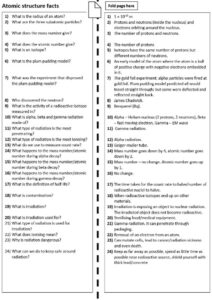
The most important thing to prioritise in revision is declarative knowledge. Without very solid factual recall, students have no hope of answering highly complex problems. I wrote a blog on this recently[4]. To achieve this first step, I thought deeply about the most important “key learning questions” that are the absolutely non-negotiable knowledge that I want students to have[5]. I then produced sheets as in the image and encouraged students to self-quiz until the answers are committed to memory.
Many contributors on “EduTwitter” have gone further and written “retrieval roulettes” to achieve similar aims. Recent sites like carousel-learning.com and kuizical.com have also allowed for remote retrieval roulettes to be implemented.
Scaffold students into doing exam questions
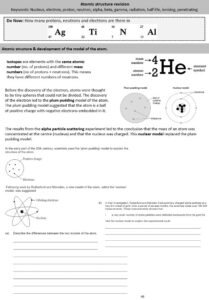
When I’m confident that the declarative knowledge is becoming solid, then I get students to start practising exam questions. I usually start off doing this in a very scaffolded way, using sheets that consist of both the core notes (to reduce cognitive load in flicking to and from a textbook) and the exam questions themselves. An example is shown in the image.
Scaffolding in this way aligns neatly with Rosenshine principles 7 (“obtain a high success rate”) and 8 (“provide scaffolds for difficult takes”) and keeps student motivation high initially.
Practice makes perfect. Practice makes permanent
Now of course this scaffold is temporary and needs to be taken away. I then get the students to undertake a vast amount of deliberate practice. Most domains of knowledge are predictable; our problem solving gets better the more problems we have solved (as we can draw out similarities).
During the process of this practice, students also practise their procedural knowledge (knowing how to do something) and conditional knowledge (knowing when to do something). Ideally, these concepts are embedded throughout the course, but revision allows an excellent opportunity to practise them further.
Give feedback
Finally, any time our students produce some work it’s really important that we offer some form of feedback on that work. I’ve recently moved away from simply going over the answers, influenced by a blog by Adam Boxer[6]. If students did badly, then they are upset and demotivated. If they did well, then they’re smug and don’t know what to do to improve.
Instead, I look at the overall themes from the work. Re-teach any concepts that students have done poorly at; and then get them to practise similar questions again. Following this, I’d give the class the opportunity to come back to this topic in retrieval “do nows” and consider tweaking next year’s scheme of work to address misconceptions/difficulties earlier.
Tag me on Twitter @edmunds_dr, and let me know how you approach GCSE Science revision sessions with your classes.
By Peter Edmunds
Many of the resources mentioned in this blog can be freely found on sciencedoctor.school.blog
[1] Image of Ebbinghaus’ forgetting curve from Chun and Heo, 2018
[2] Credit for original template to the Harris Federation
[3] https://www.tes.com/news/interleaving-are-we-getting-it-all-wrong
[4] https://sciencedoctor.school.blog/2020/09/12/the-role-of-declarative-knowledge-in-problem-solving/
[5] https://achemicalorthodoxy.wordpress.com/2018/03/02/fixing-key-stage-3-core-questions/
Watch Peter’s talk at the ASE Conference 2021 to find out more about running revision sessions and his upcoming AQA GCSE Science (9–1) Equations Practice Pack
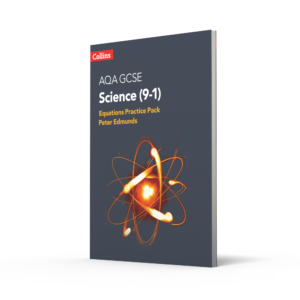 AQA GCSE Science (9–1) Equations Practice Pack
AQA GCSE Science (9–1) Equations Practice Pack
- Differentiated practice for all science equations at Foundation and Higher level
- Fully editable, photocopiable and printable teacher pack
The AQA GCSE Science (9–1) Equations Practice Pack by Peter Edmunds is publishing May 2021.
